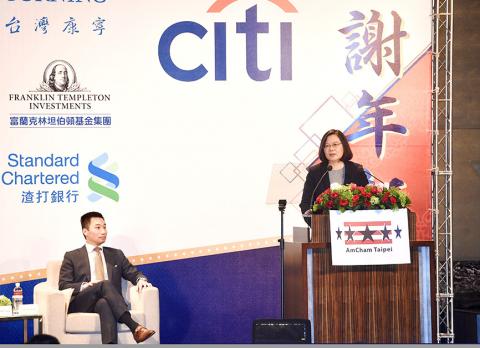The nation’s democracy and resulting development are an example for the Indo-Pacific region, a visiting US Department of State official said yesterday as he reiterated Washington’s commitment to supporting Taiwan’s international participation and helping it defend its democracy.
Alex Wong (黃之瀚), deputy assistant secretary at the department’s Bureau of East Asian and Pacific Affairs, made the remarks in a speech at the 50th annual Hsieh Nien Fan (謝年飯) banquet hosted by the American Chamber of Commerce (AmCham) in Taipei.
It was the only public appearance Wong is expected to make during his three-day visit, the first by a US official since Washington on Friday last week enacted the Taiwan Travel Act, which encourages high-level visits by Taiwanese and US officials.

Photo: Peter Lo, Taipei Times
However, the American Institute in Taiwan has denied a link between Wong’s visit and the new legislation, a stance echoed last night by AmCham Taipei chairman Albert Chang (章錦華), who said that they were classmates at Harvard Law School and that he agreed to visit months ago.
“Tonight should be about looking forward. Yes, we have done much to deepen US-Taiwan relations, but my message tonight is this: Let’s do more,” Wong said.
Taiwan’s constitutional democracy is an example for the entire Indo-Pacific region, because dynamic, broad-based and sustainable economic growth can only arise in the stable and certain conditions created under a constitutional government, Wong said.
“For that example to have the most force, for that example to do the most good, Taiwan can no longer be excluded unjustly from international fora,” Wong said.
Denying Taiwan the chance to share its experiences in public health, humanitarian relief and sustainable development would be unjust for anyone who could benefit from them, Wong said, pledging continued joint efforts between the US government and private sector to ensure that “Taiwan’s stellar international example shines brightly.”
Wong also lauded Taiwan’s efforts to forge close economic ties with nations throughout the Indo-Pacific region via the New Southbound Policy, which he said is vital to consolidating the free and open rules-based order in the region.
“The final thing I am certain of is the US’ support for Taiwan,” Wong said, adding that Washington would continue to bolster Taiwan’s ability to defend its democracy and ensure that its people can travel on their chosen path free from coercion.
In her opening remarks, President Tsai Ing-wen (蔡英文) had a light-hearted exchange with Wong, when she jokingly said she was “allergic” to Harvard Law School because she was not admitted.
Tsai then expressed her gratitude to US President Donald Trump’s administration and the US Congress for supporting the act.
“We also welcome deputy assistant secretary Wong as the latest to be here following visits by senior US officials at the state department, department of commerce, small business administrations and more,” she said.

INVESTIGATION: The case is the latest instance of a DPP figure being implicated in an espionage network accused of allegedly leaking information to Chinese intelligence Democratic Progressive Party (DPP) member Ho Jen-chieh (何仁傑) was detained and held incommunicado yesterday on suspicion of spying for China during his tenure as assistant to then-minister of foreign affairs Joseph Wu (吳釗燮). The Taipei District Prosecutors’ Office said Ho was implicated during its investigation into alleged spying activities by former Presidential Office consultant Wu Shang-yu (吳尚雨). Prosecutors said there is reason to believe Ho breached the National Security Act (國家安全法) by leaking classified Ministry of Foreign Affairs information to Chinese intelligence. Following interrogation, prosecutors petitioned the Taipei District Court to detain Ho, citing concerns over potential collusion or tampering of evidence. The

TRADE: The premier pledged safeguards on ‘Made in Taiwan’ labeling, anti-dumping measures and stricter export controls to strengthen its position in trade talks Products labeled “made in Taiwan” must be genuinely made in Taiwan, Premier Cho Jung-tai (卓榮泰) said yesterday, vowing to enforce strict safeguards against “origin laundering” and initiate anti-dumping investigations to prevent China dumping its products in Taiwan. Cho made the remarks in a discussion session with representatives from industries in Kaohsiung. In response to the US government’s recent announcement of “reciprocal” tariffs on its trading partners, President William Lai (賴清德) and Cho last week began a series of consultations with industry leaders nationwide to gather feedback and address concerns. Taiwanese and US officials held a videoconference on Friday evening to discuss the

NEGOTIATIONS: The US response to the countermeasures and plans Taiwan presented has been positive, including boosting procurement and investment, the president said Taiwan is included in the first group for trade negotiations with the US, President William Lai (賴清德) said yesterday, as he seeks to shield Taiwanese exporters from a 32 percent tariff. In Washington, US Trade Representative Jamieson Greer said in an interview on Fox News on Thursday that he would speak to his Taiwanese and Israeli counterparts yesterday about tariffs after holding a long discussion with the Vietnamese earlier. US President Donald Trump on Wednesday postponed punishing levies on multiple trade partners, including Taiwan, for three months after trillions of US dollars were wiped off global markets. He has maintained a 10 percent

PERSONAL DATA: The implicated KMT members allegedly compiled their petitions by copying names from party lists without the consent of the people concerned Judicial authorities searched six locations yesterday and questioned six people, including one elderly Chinese Nationalist Party (KMT) member and five KMT Youth League associates, about alleged signature forgery and fraud relating to their recall efforts against two Democratic Progressive Party (DPP) legislators. After launching a probe into alleged signature forgery and related fraud in the KMT’s recall effort, prosecutors received a number of complaints, including about one petition that had 1,748 signatures of voters whose family members said they had already passed away, and also voters who said they did not approve the use of their name, Taipei Deputy Chief Prosecutor